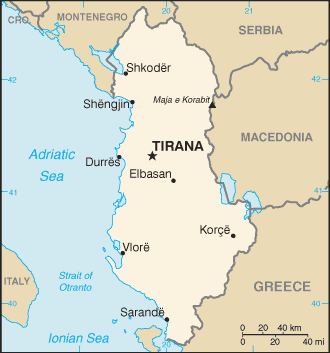![]() Vacanze da sogno
Vacanze da sogno
Hotel, Voli, Vacanze, Noleggio auto
|
|
||||
|
|
Albania |
|||

| Dati del Paese | Avvisi particolari |
|
|
| Bandiera |
|
||
| Capitale | Informazioni generali | ||
| Popolazione | |||
| Superficie | |||
| Fuso Orario | |||
| Lingue | |||
| Religione | |||
| Moneta | |||
| Ambasciata italiana | |||
| Between 1990 and 1992 Albania ended 46 years of xenophobic Communist rule and established a multiparty democracy. The transition has proven challenging as successive governments have tried to deal with high unemployment, widespread corruption, a dilapidated physical infrastructure, powerful organized crime networks, and combative political opponents. Albania has made progress in its democratic development since first holding multiparty elections in 1991, but deficiencies remain. International observers judged elections to be largely free and fair since the restoration of political stability following the collapse of pyramid schemes in 1997. In the 2005 general elections, the Democratic Party and its allies won a decisive victory on pledges of reducing crime and corruption, promoting economic growth, and decreasing the size of government. The election, and particularly the orderly transition of power, was considered an important step forward. Although Albania's economy continues to grow, the country is still one of the poorest in Europe, hampered by a large informal economy and an inadequate energy and transportation infrastructure. Albania has played a largely helpful role in managing inter-ethnic tensions in southeastern Europe, and is continuing to work toward joining NATO and the EU. Albania, with troops in Iraq and Afghanistan, has been a strong supporter of the global war on terrorism. | |||
| Giornali newspaper | Giornali di Albania |
| Indirizzi utili | ||||
| Ufficio turistico | ||||
| Strutture Sanitarie |
| Situazione climatica / Climate |
|
|||
| Economy | Lagging behind its Balkan neighbors, Albania is making the difficult transition to a more modern open-market economy. The government has taken measures to curb violent crime and reduce the large gray economy. The economy is bolstered by annual remittances from abroad of $600-$800 million, mostly from Albanians residing in Greece and Italy; this helps offset the towering trade deficit. Agriculture, which accounts for about one-quarter of GDP, is held back because of lack of modern equipment, unclear property rights, and the prevalence of small, inefficient plots of land. Energy shortages and antiquated and inadequate infrastructure contribute to Albania's poor business environment, which make it difficult to attract and sustain foreign investment. The planned construction of a new thermal power plant near Vlore and improved transmission and distribution facilities eventually will help relieve the energy shortages. Also, the government is moving slowly to improve the poor national road and rail network, a long-standing barrier to sustained economic growth. On the positive side, growth was strong in 2003-06 and inflation is low and stable. | |||
Per segnalare aggiunte o correzioni da effettuare sulla scheda Mondo, inviaci un'email